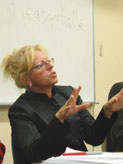Fed visits class
After spending a week plowing through the Report of the Commissioner of the Environment and Sustainable Development to the House of Commons, the students of Religious Studies 345 and 347 were treated to a surprise on January 30. Professor Norman Cornett organized a "collective blind date" between his 110 students and five special guests: Robert Bonnell, McGill professor of water resource management; Charles Gonthier, former justice of the Supreme Court of Canada; Hélène Trudeau, law professor at the Université de Montréal; Colin Scott, McGill anthropology professor; and Johanne Gelinas, Canada's Commissioner of the Environment and Sustainable Development.

Federal Commissioner Johanne Gelinas
Erica Zelfand
Much of the dialogue that evening focused on the condition of drinking water in First Nations communities - a topic so pressing that it has earned its own chapter in the 2005 Commissioner's Report. In 2001, Indian and Northern Affairs Canada found that serious health risks lurked in 75 percent of the water systems on First Nations reserves. Scott noted that many of these problems have been caused by "the silly design of some of these water systems, in which drinking water is drawn downstream from sewage sites." He added, "Social inequality is at the root of this particular problem." Gelinas explained, "When I did that audit it was an eye-opener for me. If you have a chance to do some volunteer work, don't look too far."
As they dove deeper into the issues of drinking water, biodiversity and sustainable development, the recurring theme of the government's ineffectual efforts to improve environmental conditions rose to the surface of the discussion. Trudeau declared that she was surprised that so many young people were so pessimistic about environmental issues. "Of course we're pessimistic!" responded Shannon Lawrence, a U2 international development and economics student, "We've just spent a week reading eight chapters about how the government can't commit." Emma Segal, a U2 sociology student, further added, "I just can't understand why these issues are at the bottom of the agenda."
The dialogic session, however, did more than just get students angry. All five of the visitors encouraged the students to be proactive in asserting environmental change. Gelinas reminded the students that it was the petitions of common Canadians that made the government address the issue of genetically modified organisms in food. Gonthier stressed that people do have the power to influence judges and lawmakers.
In response, the students have elected to undertake two on-campus petitions. They are going to push for more recycling bins, and they are also going to battle the Coca Cola company over its recent policy change, which states that rebates will no longer be given for empty cans from non-carbonated beverages. Cornett explained that his students have the power to think globally and act locally: "We put a man on the moon in the sixties! Don't tell me we don't have the means to clean up the environment. We have the means! And we're going to do it!"

